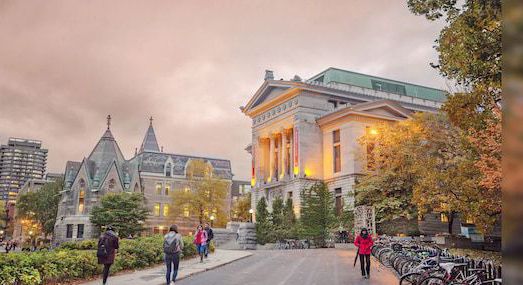EDUCATION
Study in Canada: Top-Ranked Universities, Popular Courses, and Application Requirements
Study in Canada: Top-Ranked Universities, Popular Courses, and Application Requirements
Canada remains one of the most attractive destinations for international students—especially those from India—thanks to its multicultural society, high-quality education system, and globally ranked universities. Institutions like McGill University, University of Toronto, and the University of British Columbia consistently draw thousands of applicants every year.

Aside from academic excellence, Canada offers students access to work opportunities, a strong focus on research, and pathways for post-study immigration. However, to study in the country, students must gain admission to a Designated Learning Institution (DLI)—an approved school, college, or university authorized by the government.
Top Universities in Canada and Their Popular Courses
1. University of Toronto
Ranked among the top two universities in Canada, the University of Toronto leads in various academic disciplines. According to the QS World University Rankings 2026, the university offers 151 undergraduate and graduate programs, maintaining strong global positions in the following areas:
- Arts and Humanities – Ranked 14th globally
- Engineering and Technology – 17th
- Life Sciences and Medicine – 13th
- Natural Sciences – 20th
- Social Sciences and Management – 14th
2. University of British Columbia (UBC)
UBC holds the third spot nationally and ranks 40th worldwide. The university is known for its strong academic diversity and offers 255 undergraduate programs and 236 postgraduate courses.
Here’s how UBC performs in different subject areas:
- Arts and Humanities – 19th globally
- Engineering and Technology – 31st
- Life Sciences and Medicine – 25th
- Natural Sciences – 22nd
- Social Sciences and Management – 20th
3. McGill University
Regarded as the top university in Canada, McGill ranks 27th in the world and provides a whopping 498 programs across undergraduate and postgraduate levels.
Its subject-wise global rankings include:
- Arts and Humanities – 36th
- Engineering and Technology – 45th
- Life Sciences and Medicine – 27th
- Natural Sciences – 48th
- Social Sciences and Management – 39th
Eligibility and Admission Requirements
Before applying for a Canadian study permit, students must receive an acceptance letter from a Designated Learning Institution (DLI). Here’s what is typically required:
- Proof of Admission: An official offer letter from a DLI.
- Financial Documents: Evidence of sufficient funds to cover tuition, living expenses, and return travel.
- Intent to Leave After Studies: Applicants must show that they plan to leave Canada upon completion of their studies.
- Medical Examination: Some students may be required to undergo a medical check-up depending on the country of residence.
Post-Graduation Opportunities
After completing their studies, graduates can apply for a Post-Graduation Work Permit (PGWP). The length and eligibility for this permit depend on the duration and type of academic program. A PGWP allows students to gain valuable Canadian work experience, which may also support permanent residency applications in the future.
Discover more from 9jaPolyTv
Subscribe to get the latest posts sent to your email.

 EDUCATION9 hours ago
EDUCATION9 hours agoNYSC Approves Mobilization for Part-Time ND, Full-Time HND Graduates — Registration Guide, Jobs, Scholarships and Next Steps

 ARTICLES8 hours ago
ARTICLES8 hours agoLegit Online Jobs in Nigeria That Pay Graduates Up to ₦200k Monthly

 EDUCATION12 hours ago
EDUCATION12 hours agoBest Online Tutoring Jobs for Nigerians That Pay in Dollars (Earn Up to $25/Hour)

 ARTICLES8 hours ago
ARTICLES8 hours agoFree TEFL Certification for Nigerians Who Want to Teach English Online

 ARTICLES8 hours ago
ARTICLES8 hours agoHow to Teach English Online From Nigeria and Earn Up to $2,500 Monthly

 ARTICLES8 hours ago
ARTICLES8 hours ago5 Work From Home Jobs for Teachers in Nigeria That Pay in Foreign Currency

 ARTICLES8 hours ago
ARTICLES8 hours agoTop Websites Hiring Nigerians for Remote Tutoring Jobs Abroad

 ARTICLES8 hours ago
ARTICLES8 hours agoDo You Need TEFL to Teach English Online in Nigeria? Here’s the Answer
































